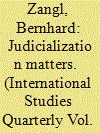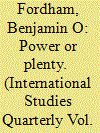|
|
|
Sort Order |
|
|
|
Items / Page
|
|
|
|
|
|
|
| Srl | Item |
| 1 |
ID:
085315


|
|
|
|
|
| Publication |
2008.
|
| Summary/Abstract |
Despite the increasing integration of markets, most political scientists contend that governments retain much policy "room to maneuver." Moreover, citizens presumably support further economic integration because they believe their governments can cushion the impacts of market forces. In this sense, globalization is compatible with democracy. Rarely, however, are data provided that demonstrate citizens' appreciation for the room to maneuver, let alone their positive evaluation of it. Who do citizens identify as most responsible for the performance of the U.S. economy, elected officials or national and international market forces? Which citizens attribute economic performance to these forces and not to their elected officials? In this article, we report results from an original experiment designed to answer these questions. We find that a good number of Americans believe that their government retains the room to maneuver. However, there exists a substantial minority that does not. We show, consistent with recent developments in the study of political psychology on distal associations and partisan motivated reasoning, that this minority is characterized according to partisanship, knowledge levels, and age. Republican partisans and more educated citizens believe there is less room to maneuver than Democratic partisans and members of older age cohorts. Generational factors also shape beliefs in the efficacy of policy control. Finally, priming subjects to think about economic globalization does not affect their responsibility attributions. The choice set matters, however. When provided the option, a significant number of respondents assign responsibility to market forces rather than elected officials.
|
|
|
|
|
|
|
|
|
|
|
|
|
|
|
|
| 2 |
ID:
085305


|
|
|
|
|
| Publication |
2008.
|
| Summary/Abstract |
Conventional wisdom suggests that biased military interventions in civil conflicts should increase the probability that the supported side will win. However, while this is the case for rebel groups, the same is not true for governments. The explanation for this surprising finding becomes clear once one considers the decision of a third-party intervener. Since interveners want to impact the outcomes of civil conflict, government- and rebel-biased interventions will be more likely when the government is facing a stronger rebel group. Given that government-biased third parties intervene in the ''toughest'' cases, empirically they appear to be less effective than rebel-biased interveners.
|
|
|
|
|
|
|
|
|
|
|
|
|
|
|
|
| 3 |
ID:
085313


|
|
|
|
|
| Publication |
2008.
|
| Summary/Abstract |
By analyzing disputes between the United States and the EU under General Agreement on Tariffs and Trade (GATT) and the World Trade Organization (WTO) respectively, the paper demonstrates that the judicialization (or legalization) of international dispute settlement procedures (IDSPs) can contribute to states' compliance with (these) dispute settlement mechanisms. The article compares four sets of pairwise similar disputes which the United States had with the EU: the so-called Domestic International Sales Corporations case (which arose under GATT) and the Foreign Sales Corporations case (which was settled through WTO procedures), the Steel case (GATT) and the Patents case (WTO), the two Hormones cases under GATT and the WTO respectively, the Citrus case (GATT) and the Bananas case (WTO). In each of the four comparisons, the United States acted more in accordance with the judicial WTO dispute settlement procedures than with the diplomatic GATT procedures. We can therefore say that contrary to realist assumptions, the judicialization of IDSPs can contribute to their effectiveness. However, contrary to idealist assumptions the effectiveness of IDSPs does not automatically follow from their judicialization. Yet, as assumed by institutionalists, judicialized IDSPs are better than diplomatic IDSPs in sustaining states' compliance with these procedures precisely because of their normative and strategic effects.
|
|
|
|
|
|
|
|
|
|
|
|
|
|
|
|
| 4 |
ID:
085309


|
|
|
|
|
| Publication |
2008.
|
| Summary/Abstract |
This manuscript explores the state's political use of the past and the function of history education in political transition and foreign relations. Modern historical consciousness in China is largely characterized by the "one hundred years of humiliation" from mid-1800s to mid-1900s when China was attacked, bullied, and torn asunder by imperialists. This research focuses initially on how such historical memory has been reinforced by the current regime's educational socialization through the national "Patriotic Education Campaign" after 1991. It then explores the impact of this institutionalized historical consciousness on the formation of national identity and foreign relations. This study suggests that, even though existing theories and literature illuminate certain aspects of China's political transition and foreign affairs behavior, a full explanatory picture emerges only after these phenomena and actions are analyzed through the "lenses" of history and memory.
|
|
|
|
|
|
|
|
|
|
|
|
|
|
|
|
| 5 |
ID:
085312


|
|
|
|
|
| Publication |
2008.
|
| Summary/Abstract |
This paper explores whether fixed exchange rate commitments and central bank independence have functioned more as institutional complements or as substitutes in achieving exchange rate stability. Focusing on the advanced industrial democracies in the post-Bretton Woods era, it argues that these two monetary institutions should have functioned in a non-complementary, but substitutable, manner with regards to this external policy goal. This argument is tested statistically using different measures of exchange rate variability and de facto exchange rate fixity. Finally, given evidence that fixed exchange rate commitments and central bank independence have not functioned as complementary institutions, this paper discusses why certain OECD (governments that are members of the Organization for Economic Cooperation and Development) governments nonetheless made fixed exchange rate commitments when their central bank was legally independent.
|
|
|
|
|
|
|
|
|
|
|
|
|
|
|
|
| 6 |
ID:
085316


|
|
|
|
|
| Publication |
2008.
|
| Summary/Abstract |
Focusing on the flow of funding to human rights non-governmental organizations (NGOs), we begin in this article to broach one of the least studied issues pertaining to transnational regimes-namely, their material underpinnings. Through an analysis of the patterns of donor funding to human rights NGOs, we underscore the triangulation between states, donors, and rights NGOs, whereby states have an impact on donor preferences, which, in turn, influences the agenda of human rights NGOs and their modes of operation, and these, in their turn, help shape the kind of NGO criticism voiced against the state. By emphasizing the important and frequently missing link of donors, we thus complicate the discussion concerning the impact human rights networks have on state policies and practices, showing how rights NGOs simultaneously weaken and strengthen the state. Accordingly, our examination of the political economy of human rights adds a new dimension to the literature analyzing how the state both reconfigures and is reconfigured by transnational regimes.
|
|
|
|
|
|
|
|
|
|
|
|
|
|
|
|
| 7 |
ID:
085306


|
|
|
|
|
| Publication |
2008.
|
| Summary/Abstract |
This paper evaluates the effect of economic interests and security concerns on American intervention in civil and international conflict. Generalizations about the relative importance of these considerations have played critical role in the historiography of American foreign relations. Although statistical analysis is well suited for evaluating such generalizations, quantitative researchers have devoted relatively little attention to the issue. Existing large-n research has generally found that security concerns matter more, but has not considered how the economic and security concerns thought to affect intervention might also influence each other. These subsidiary relationships complicate efforts to assess the relative importance of these two influences on intervention. Evidence concerning intervention in international crises and civil wars indicates that, while alliance commitments and rival behavior have a greater immediate impact on American intervention, exports have an important indirect effect by shaping alliance commitments in the long run.
|
|
|
|
|
|
|
|
|
|
|
|
|
|
|
|
| 8 |
ID:
085307


|
|
|
|
|
| Publication |
2008.
|
| Summary/Abstract |
Facilitating peace settlements among parties to a civil war represents a key challenge for policymakers. In spite of the grave consequences and relatively high frequency of civil wars, we know little about how best to manage them. In this article we examine the linked questions of under what conditions third parties provide and warring parties accept offers of mediation in civil wars. Our analysis suggests that third-party offers are closely tied to the interests a third party has in a civil war state as well as the historical ties between the third party and civil war state. Importantly, we note critical distinctions between the conditions that encourage offers of mediation from those that foster its acceptance. The theoretical and policy implications of knowing when to offer and the conditions under which an offer will be accepted could have dramatic effects on civil war termination.
|
|
|
|
|
|
|
|
|
|
|
|
|
|
|
|
|
|
|
|
|